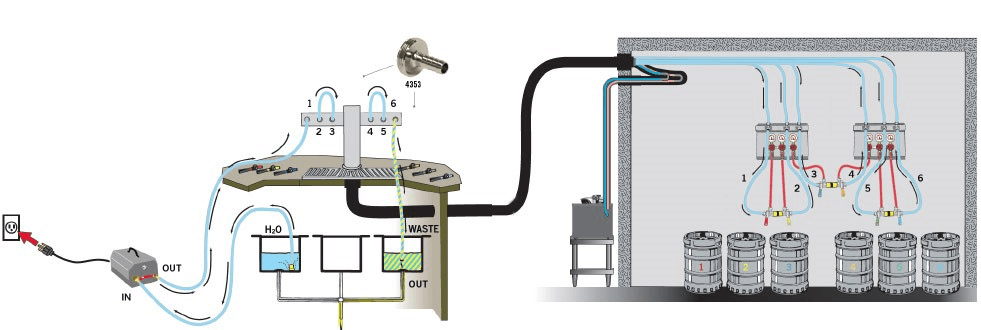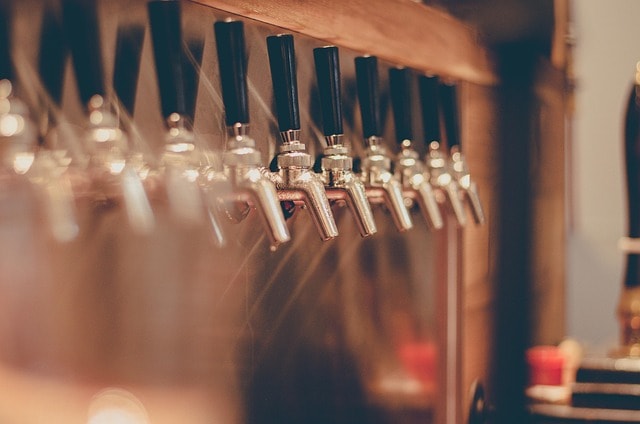Draft Beer System Installers: Expert Solutions for Perfect Pours

Draft beer system installers are professionals who specialize in designing, installing, and maintaining draft beer systems for bars, breweries, and other venues. These experts work with a variety of system components such as faucets, glycol chillers, regulators, and CO2/N2 mixing stations to create the perfect draft beer experience. Choosing the right system installer is crucial to ensure that your draft beer system is properly set up, maintained, and serviced throughout its lifespan.
In addition to expert installation and cleaning services, new draft beer system installers often provide maintenance services and support for their clients. This ensures that draft systems continue to function optimally, preserving the quality and taste of your beer. Furthermore, many installers offer customizable solutions to fit the unique needs of individual establishments, allowing for tailored systems that cater to specific requirements and preferences.
Key Takeaways
- Draft beer system installers are experts in designing, installing, and maintaining systems for optimal beer quality and taste.
- Choosing the right installer is essential for ensuring proper setup, maintenance, and support.
- Customizable solutions are available to meet the unique needs and preferences of individual establishments.

Why Draft Beer Systems Matter
Draft beer systems are an essential component of establishments that serve beer on tap, such as bars and restaurants. These systems play a vital role in maintaining the quality and freshness of the beer while preserving its optimal taste and temperature.
Temperature and Pressure: A well-maintained draft or beer dispenser system will ensure that the beer is dispensed at the recommended temperature of 38 degrees. Maintaining this specific temperature is crucial, as it prevents the beer from foaming excessively, thereby enhancing the overall customer experience. Additionally, these systems regulate the applied pressure, which is vital for proper beer flow and carbonation.
- Air Cooled Systems: Such systems utilize a forced air blower to maintain the temperature within the draft lines and tower. This setup is usually effective for draft systems with runs of 25 feet or less.
- Glycol Cooled Systems: These systems use glycol chillers to control the temperature and work well for longer draft lines.
Versatility: Draft beer systems can be tailored to the specific needs of a bar or brewery. For instance, they can be designed to serve beer from kegs, brite tanks, or serving tanks. This adaptability allows businesses to offer a wide variety of beers while optimizing their own space and draft system performance.
Economical and Eco-friendly: Draft beer systems can save both money and resources by reducing the need for packaged beer products. This translates to lower packaging costs and decreased waste, which is beneficial to the environment. Moreover, establishments can also offer draft beer at competitive prices, making it an attractive option for customers.
In conclusion, draft beer systems serve as an integral part of the beverage service, of any establishment offering beer on tap. Their ability to maintain optimal temperature and pressure, combined with their versatility and eco-friendly nature, makes them indispensable for preserving the beer's quality and providing an enjoyable experience for customers.
Choosing the Right Installer
Experience and Reputation
When looking for a draft beer system installer, it's essential to consider their experience and reputation in the industry. A company with a proven track record and several years of experience will likely provide high-quality service. Browse the installer's website to check their past projects and look for testimonials or reviews from their clients.
For example, Renny's Draft Solutions is a company with an expert team that provides full-service design, installation, and maintenance for draft beer systems.
Certification and Licensing
Another crucial aspect in choosing the right installer is verifying if they have the necessary certifications and licensing. A reliable installer will hold the required permits and credentials to operate in their specific region and industry. It is essential to verify their qualifications and ask for proof of any relevant certifications. This ensures that the installer is knowledgeable and complies with industry standards and guidelines.

Services Offered
It's also important to take into account the range of services offered by the draft beer system installer. A good draft beer installer should provide a comprehensive package, including:
- System design and consultation
- Proper equipment selection
- Installation
- Maintenance and repair
Companies like Renny's specialize in all aspects of draft beer system design and installation, from small direct draw systems to long-draw, remote systems, tailoring their services to meet your specific needs.
In conclusion, when choosing the right draft beer system installer, it's essential to consider their experience and reputation, certifications and licensing, and the array of services they offer. By keeping these key factors in mind, you can make a well-informed decision and ensure a seamless installation process for your new draft beer system equipment.
Cost and Financing Options
When considering the installation of a custom draft beer system here, the cost is an important factor to take into account. The price of a draft beer system installation depends on a few components such as the size of the system, complexity of the design, and type of equipment used.
A basic draft beer system, typically consisting of kegs, taps, and lines, can range from $1,000 to $5,000. On the other hand, more advanced systems with glycol cooling, custom tap handles, and digital monitoring may cost anywhere between $10,000 to $50,000.
Customization plays a significant role in determining the cost of your draft beer installation. Most companies provide a free consultation to help assess your needs and provide an accurate quote. For instance, Renny's Draft Solutions ensures that their custom draft beer systems meet your operational and business goals while maximizing performance. They also guarantee their work and stand behind it.
Regarding financing options, some companies might offer payment plans or lease-to-own arrangements to help reduce the financial burden of purchasing a full system upfront. It's essential to discuss such options with your chosen installer or supplier.
In summary, the cost of a draft beer system depends on several factors, such as the size, complexity, and customization options. Budget accordingly and consult with professional installers who can provide detailed quotes and financing options to ensure a seamless drafting experience for your establishment.
Installation Process
Equipment Setup
The initial step in installing a draft beer system involves the setup of the necessary equipment, such as walk-in coolers, draft towers, faucets, glycol chillers, beer trunk lines, regulators, CO2/N2 mixing stations, tavern heads, pumps, and empty beer detectors. This process may vary slightly depending on the type of system you install and the specific needs of the establishment.
Professional draft tower installers, ensure a smooth installation process by combining their experience in the construction industry with in-depth knowledge of draft beer systems.
Balancing Your Draft Beer System
Balancing a draft beer system helps maintain the right pressure and flow rate for optimal beer serving. Factors to consider when balancing a commercial beer tap system include:
- Beer line length and diameter: After measuring the distance between the keg and faucet, installers will determine the appropriate line length and diameter.
- Temperature: Maintaining a consistent temperature throughout the system (around 38°F or 3.3°C) is crucial to preventing foam and off-taste issues.
- Pressure: Both gas type and pressure settings must be taken into account, and installers will adjust regulators to ensure proper CO2 or Nitrogen delivery.

Draft system providers like Renny's offer customized solutions to achieve optimal balance for each client.
By taking these factors into account and following the guidance of experienced installers, establishments can ensure their draft beer system is set up and balanced properly, resulting in delicious, perfectly poured beverages for their customers.
Maintaining Your Draft Beer System
Routine Checks
Regular inspection is crucial to ensure the longevity and effectiveness of your draft beer system. Conduct biweekly checks for visible issues such as leaks, mold, and loose connections. Verify that the beer temperature is consistently at 38°F to avoid compromising the beer's quality. Monitor the system's pressure levels and ensure they align with the beer's carbonation level and serving altitude.
Troubleshooting Common Issues
Encountering problems in your draft beer system is inevitable. Addressing these issues promptly helps maintain optimal system performance:
- Foamy Beer: Causes might include improper temperature, incorrect pressure, or an obstructed beer line. Check the temperature and pressure settings, and inspect the beer line for blockage or kinks.
- Flat Beer: Likely caused by insufficient pressure or a dirty beer line. Adjust the pressure settings and clean the beer line as needed.
- Off-Tasting Beer: This could be a result of contaminated lines, a dirty faucet, or stale beer. Regular line cleaning and faucet maintenance is essential to prevent this issue.
Maintenance
Regular maintenance is key to keeping a draft beer system functioning optimally. A minimum of every 14 days, clean the lines, faucets, keg couplers, and any other components exposed to beer. Additionally, replace worn-out parts like the beer tap, gaskets, and rubber seals to avoid air leaks and suboptimal performance.
For a systematic approach, establish a maintenance timeline that includes:
- Daily: Inspect for leaks and system issues
- Weekly: Check temperature and pressure settings
- Biweekly: Perform line cleaning
- Quarterly: Replace worn-out parts and assess overall system health
Line Cleaning
Cleaning your draft beer system lines regularly is crucial to ensure the system's proper functionality and the beer's quality. During this process, flush the lines with a line-cleaning solution to remove any accumulated debris, yeast, or mold. Follow the solution with a water rinse to eliminate any residue. Then, disassemble and clean the faucets, couplers, and any other beer-contacting components.

By maintaining your draft beer system with routine checks, troubleshooting common issues, and keeping up with regular maintenance and line cleaning, you can ensure the system functions efficiently and delivers a quality craft beer experience.

Summary
Draft beer system installations are an essential part of any establishment that serves beer on tap. These systems ensure that the beer remains fresh and at the ideal temperature for customers to enjoy. There are several companies specializing in the design, installation, and maintenance of draft beer dispensing systems such as Renny's Draft Solutions.
Draft beer systems can range from small direct-draw installations to larger long-draw, remote systems. A successful installation of commercial draft beer can requires expertise in several components, which may include:
- Walk-in coolers: Crucial for maintaining a consistent beer temperature.
- Draft Towers: The visible part of the system where the beer is dispensed.
- Drip Trays: Collect any spilled beer during dispensing.
- Faucets: The mechanism used to pour the beer into a glass.
- Glycol chillers: Help maintain the beer's temperature as it travels through the lines.
- Beer trunk lines: Insulated conduit for beer lines and glycol lines.
When selecting a company for installing your draft beer system, it's essential to consider their expertise in design and installation. Additionally, finding a provider that offers ongoing support and maintenance, is crucial to ensure your system's efficient operation.
In conclusion, the proper installation and maintenance of a draft beer system greatly contribute to the quality of the beer served, leading to a satisfying customer experience. By choosing the right installer, any establishment serving beer or wine on tap can be confident in providing patrons with the perfect pour every time.



